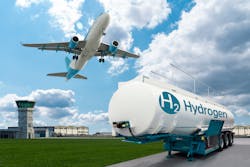Collins Aerospace selected to lead consortium related to storing liquid hydrogen for aviation
CORK, Ireland - A public-private partnership in Europe have announced Collins Aerospace, a Raytheon Technologies company based in Charlotte, N.C., will lead an international consortium to develop new thermoplastics technology for the liquid hydrogen tanks necessary to power hydrogen propulsion architectures in future more sustainable aircraft.
The Clean Hydrogen Joint Undertaking partnership, led by Collins, will bring together Collins sites across France, Italy, United Kingdom, Poland, the Netherlands, U.S. and Ireland along with NLR, Delft University of Technology, ATR, Novotech, and Unified International.
While liquid hydrogen contains approximately three times as much energy per kg as traditional jet fuel, it has a lower specific density meaning that it requires nearly four times as much volume to match the energy content of the same mass of traditional jet fuel. To overcome this, thermoplastic tank structures are in development. This strong, yet lightweight tank design is the focus of the new project.
Collins says that this project has the potential to go beyond by designing and manufacturing a disruptive tank through novel fabrication technologies enabling a 60% reduction in production energy consumption and at least 50% in production time leading to lower manufacturing costs.
Thermoplastic composites are advanced materials known for their durability and unique manufacturing characteristics. The material is lightweight, suitable for extreme temperatures and has the capacity to be recycled.
"The COCOLIH2T project addresses the challenges of shifting from traditional jet fuel to a fully sustainable, clean burning hydrogen fuel" said Mary Lombardo, vice president, Advanced Technologies at Collins Aerospace. "Compared with traditional fuel tanks, hydrogen tanks must reduce weight and enable containment of cryogenic fluid. COCOLIH2T is the kind of aerospace industry cross-collaboration Collins is focused on to reduce the environmental impact of aviation and lead us to a sustainable future."
